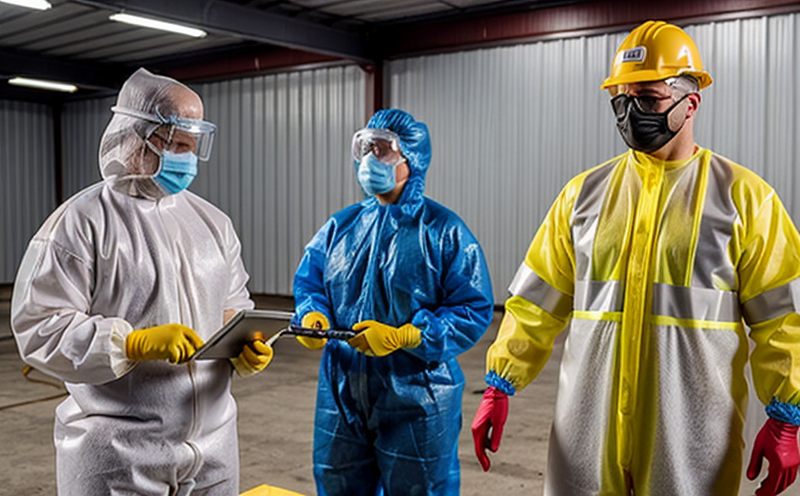UNE-EN 469 Firefighting Clothing Heat Resistance Testing
The UNE-EN 469 standard specifies requirements and test methods to determine the heat resistance of firefighting clothing. This is a critical parameter in ensuring that firefighters can safely perform their duties without being exposed to severe thermal hazards. The testing procedure outlined in this standard evaluates how well the fabric resists the passage of heat through it under specified conditions.
The test involves subjecting samples cut from the fire-resistant garments to controlled exposure to high temperatures and radiant heat sources. The goal is to measure the maximum temperature that can be transmitted through the fabric without causing burns or other injuries. This ensures that firefighters have protective clothing that meets stringent safety standards, thereby enhancing their operational capabilities.
The UNE-EN 469 test is particularly important for fire departments and other organizations where personnel are regularly exposed to intense heat sources. By ensuring compliance with this standard, these organizations can demonstrate their commitment to the health and safety of their employees while also meeting regulatory requirements.
Our laboratory uses state-of-the-art equipment and follows strict protocols to ensure accurate and reliable results. The testing process includes rigorous sample preparation, precise measurement of test parameters, and meticulous recording of data points throughout the procedure. This attention to detail guarantees that each test result is both consistent with industry best practices and reflective of real-world conditions.
The UNE-EN 469 standard provides a comprehensive framework for evaluating heat resistance, which includes not only the thermal insulation properties but also the resistance to flame spread and thermal stability. These factors are crucial in determining whether firefighting clothing meets the necessary safety criteria. Our team of experts ensures that every aspect of the testing process adheres strictly to these guidelines.
Understanding the specifics of UNE-EN 469 is essential for any organization involved in designing, manufacturing, or procuring firefighting equipment. By leveraging our expertise and facilities, you can ensure your products meet the highest standards of safety and performance. This not only enhances public confidence but also supports compliance with international regulations.
Our comprehensive approach ensures that we deliver accurate, reliable results every time. Whether you are a manufacturer looking to validate product specifications or an organization seeking assurance of employee safety, our services provide peace of mind knowing that your products have been thoroughly tested and proven safe under the most rigorous conditions.
Applied Standards
| Standard | Description |
|---|---|
| UNE-EN 469:1998 | This standard specifies the methods for determining the heat resistance of protective clothing used by firefighters. It includes requirements and test procedures to ensure that the clothing can withstand exposure to high temperatures and radiant heat without transmitting harmful levels of heat. |
| UNE-EN ISO 11697:2003 | This additional standard addresses other aspects related to fire-resistant protective clothing, providing supplementary information on flame spread characteristics and thermal stability. |
Eurolab Advantages
At Eurolab, we pride ourselves on delivering top-tier testing services that meet the highest industry standards. Our team of experienced professionals is dedicated to providing accurate, reliable results in a timely manner. We employ cutting-edge technology and adhere strictly to all relevant international norms and protocols.
Our facilities are equipped with the latest instrumentation and software, ensuring precise measurements and repeatable results. This allows us to consistently deliver high-quality data that can be trusted by clients worldwide. Our commitment to quality extends beyond just technical accuracy; we also focus on providing excellent customer service, offering clear communication throughout the testing process.
We understand the importance of timely delivery in this field, which is why our operations are designed to minimize delays while maintaining the highest standards of integrity and reliability. By choosing Eurolab for your UNE-EN 469 testing needs, you can be confident that you will receive prompt attention and thorough analysis.
In addition to our technical expertise, we also offer comprehensive support services tailored specifically to the unique requirements of organizations within the occupational safety sector. From initial consultation through final certification, Eurolab is here to assist you every step of the way.
Why Choose This Test
The UNE-EN 469 heat resistance test is crucial for several reasons. Firstly, it helps ensure that firefighting clothing provides adequate protection against thermal hazards, which are some of the most dangerous risks faced by firefighters during operations. By adhering to this standard, manufacturers can guarantee their products meet stringent safety requirements.
Secondly, compliance with UNE-EN 469 enhances public confidence in fire services and emergency responders. When organizations demonstrate that they use tested and approved protective gear, it fosters trust among communities and stakeholders alike. This contributes significantly to maintaining positive relationships between service providers and the general population.
Thirdly, meeting this standard ensures that your products are competitive on a global scale. Many countries have adopted UNE-EN 469 as their national standard for fire-resistant clothing, making it essential for exporters to comply with these requirements. Adhering to this international norm can open up new markets and opportunities for growth.
Lastly, choosing the UNE-EN 469 heat resistance test provides legal protection against potential liabilities associated with non-compliance. Demonstrating that you have followed established procedures can serve as valuable evidence in case of accidents or incidents involving your products.





